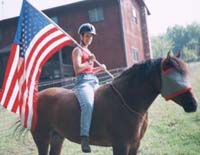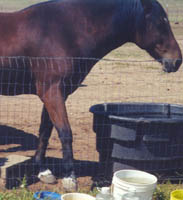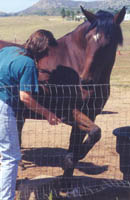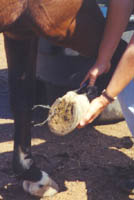
| |
|
|
 |
|
|
The Click That Calms by Nancy and Dan Allen  It was at Christmas time, several years ago, that I began using the clicker to calm my horse, Dan. We'd had a heavy storm of freezing rain that covered everything with a thick layer of solid ice for nearly a week. Our little metal barn turned into an echo chamber as broken tree branches came crashing down onto its roof. Every time he heard a noise, Dan would jump and high tail it out of there. It didn't matter what or who was in his way! It was every man (and horse) for himself! The ice lay heavy on the trees and branches were cracking like shot gun blasts. They weren't having a saturation effect on Dan either, but rather his reactions were getting worse and worse. He was one upset Curly horse! By the time he knocked me down on his charge through the doorway, I decided that it was time for a change! We started slowly inside the icy barn. I took a metal rake and ever so lightly scratched the wall with it. Dan's head popped up. His eyes got big and he ran out of the barn. He stopped a few feet outside the doorway-I clicked! Dan's head swung around looking for the treat! The hook was in! Now let the games begin! You may already know the story. Girl has fearful horse. Girl clicks horse. Horse learns how to be brave. Alexandra Kurland recently wrote a nice piece about spooking and how to help the horse to control his body when a spook overtakes him. One thing that she mentioned was especially meaningful to me: "I cannot ask my horse for something I have not taught him." So true! This also applies to asking my horse to relax when he hears a click. He must be taught how to do it. Survival runs deeply in the horse and fear is it's natural counterpart. Fear pumps him up and gets his jets firing. Once it's started, it can be hard to stop. We've probably all experienced the power of fear in a horse. His mind focuses on one thing: getting away from whatever is scaring him and it doesn't matter who is in his way. That's how I ended up getting the seat of my pants soaked and a bruised tailbone on the icy ground that day a couple of winters ago! In my mind, the click calms because it contains a promise that is never broken. A promise that only good things are to come. 100% consistent. It never varies. The horse can always count on it. Practice makes perfect even in a fearful situation, when, in the beginning, even the click cannot be heard by some horses. With Dan, I thought, he's got to be in a scary situation to learn how to listen in one. How can he hear that click, with fear running so loudly through his ears, if he hasn't learned to recognize it while the adrenaline is flowing? I started to take Dan into new situations that I expected him to have some fear of. I did it on the ground in the beginning, and later under saddle. For example, if my neighbors were plowing their fields, we got out there with them. Dan learned that with the click and my confident attitude, heck, that tractor wasn't scary, in fact, it was kind of interesting! The clicker helps me too! Every time I use it, I become more confident. Dan not only hears the click that calms but I do too. He looks to me to see what my reaction is. "How does she feel about this?" He can physically see that I have no fear of these new things so why should he? Every time my clicker works (and it hasn't failed me yet!) I grow more and more assured. I become more able to help my horse. The clicker plays a dual role in building bravery. Tom Dorrance has stated that you want to get your horse to a place of trust where he feels that he will be safe going straight up a tree if you asked him to. He's also said that the horse's confidence is so easy to build, but even easier to destroy. The clicker helps me build a strong foundation
in which my horse's confidence in me can grow. I can't take this responsibility
lightly though. The clicker works so well because, if applied correctly, it is
always consistent. I, too, have to be that way in how I treat my horse and in
what I ask him to do. Responding with understanding. Never asking for something
that he has not been taught or is not prepared to do. Not letting him get into
a position that is not good. Teaching him, that with me, anything is
possible-but we will learn it as partners, quickly if we can, but slowly if we
must! Morgan's Fence Incident  Morgan gets caught up in the fence. He starts to pull back, but is given the calm-down cue.  He stands calmly while Holly cuts him out.  Still standing calm prior to removing the wire from between hoof and shoe. The stress feed-back loop was entirely circumvented leading to no fear/flight adrenaline. Morgan found a new scenario to practice our click for calm routine (getting his shoe caught in the fence was getting too easy). This evening when I went to feed, Morgan's nose looked like a pin cushion. How he managed to jam so many cactus spines into his nose is something only he'll ever know. So now I've got to get them out. But when I try to go straight for the spines, he yanks his head away. Ah ha! Here's one of those great opportunities Nancy was talking about! It just so happens that for the last couple of weeks we've been "playing" at Morgan resting his face between my two hands. Lest ye think this sounds like no big deal, try it with your horse. Many horses instantly react by pulling their heads up away. I asked him to rest his face in my hands. "Cool, it's the 'face' game!", he's thinking. A little tough on my hands though, as each time I feed him some Cheerios I'm gettin' stuck by the cactus spines! It was a fast progression to having him stay still while I plucked each spine out (to be nice to him, I clicked and treated for each spine - hey, they're only Cheerios!). So who said clicker training is only for tricks! "If this had been a real medical emergency"... Editorial Note: Why didn't we get a picture of that??
|
|||||||||||||||
Copyright 1994 to 2024 Equiworld at Hayfield, Aberdeen, Scotland - 30 years on the web. Archived Version.